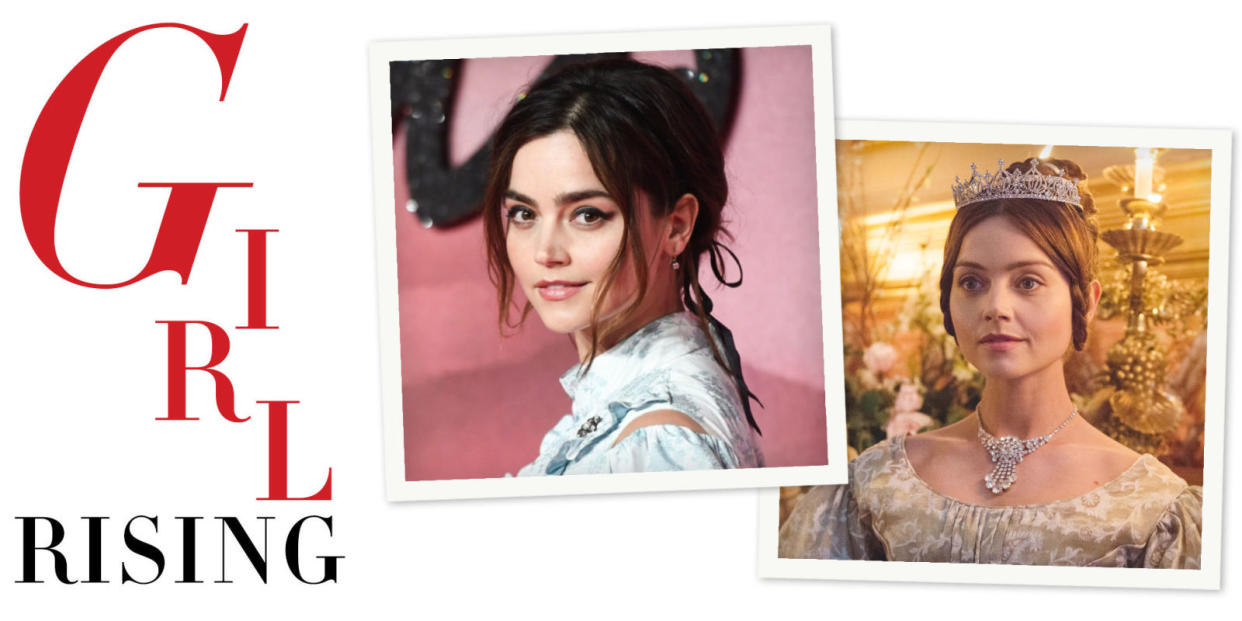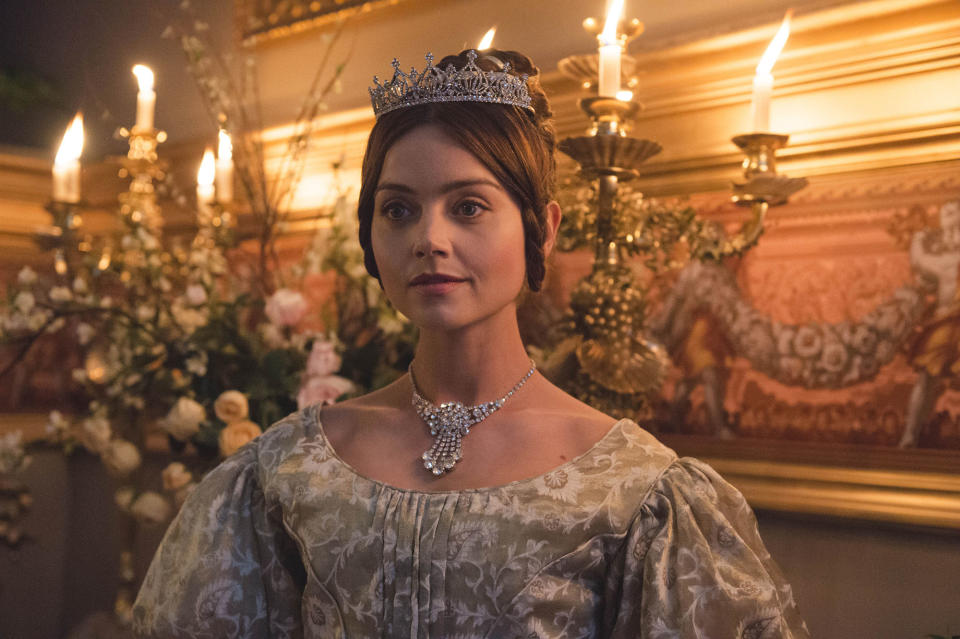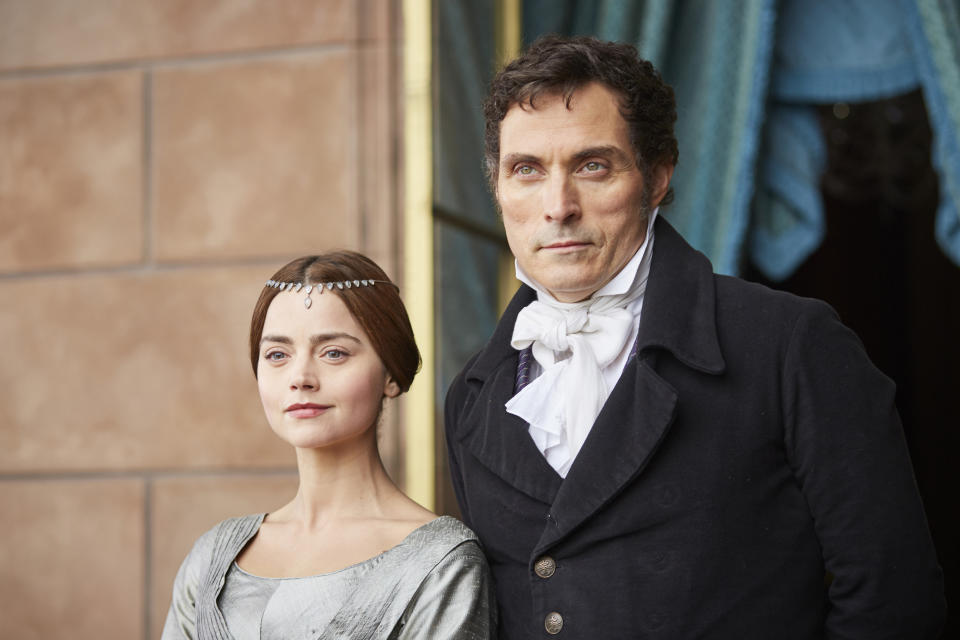Jenna Coleman on Becoming Queen Victoria

On Sunday night, after seven episodes of mischief, romance and the beginnings of an unprecedented reign, we watched Queen Victoria welcome her first child with Prince Albert on the season finale of Victoria on Masterpiece on PBS. But the breakout hit, which chronicles the rule of Great Britain's second longest-reigning monarch, is only just getting started (we still have 61 years to go). BAZAAR.com called up the queen herself, Jenna Coleman, to discuss donning Victoria's legendary crown and what to expect from Season 2, which is currently filming in the UK.
On her impression of Queen Victoria before playing her onscreen:
"I think, like most people, it was of the black, stern photographs we see of her. I knew she was known for being a passionate young queen and spirited, but I didn't really know her character at all. I was really surprised and I think I keep on being surprised, actually, the more I learn about her."

On what she learned during her research:
"Lots of things. Trying to get a grasp on her; when you begin reading the biographies and her diaries-I was really shocked, first off, by how candid she is and how frank, and how much she's there for us, given that these diaries are also edited by her daughter. It's really interesting that she's so open and effusive and [has] nothing to hide, will tell you every story, what she ate for breakfast-everything is there. I found that really charming, actually. Victoria's context in so many ways is really inconsistent, but there's a kind of honesty there. I think given her position, I find it really charming that she's as candid as she is.
I have always accepted that Queen Victoria was, up until very recently, our longest-reigning monarch. I never really considered that she was only 18 the day that she became queen, a role that she was born into. [She] didn't have a choice, had grown up in the manner in which she had grown up without a father figure and her mother, who she didn't trust. [Victoria] had never been in a room with a man on her own before, had never slept in a bedroom on her own before, and [she] woke up the following day to govern the entire nation. Again, it's part of what's so charming when you read these. She talks about people that she met, and when you experience her falling in love with Albert, and becoming a mother for the first time, it's so relatable to go through everything that we go through now. Obviously, she has the extra responsibility of happening to be queen at the same time and being a teenager and learning all these lessons that teenagers learn at some point. It's a real journey told through a very unique set of eyes."
"The Victorian era, socially, politically, historically, was a real kind of revolution, and a young girl was leading this and was the face of this."
On her favorite part of playing Victoria:
"In terms of her moods and emotions, they're kind of brimming at the surface. And it's one of the first things Daisy [Goodwin, the show's creator] said to me. She kept saying, 'She's guileless. Imagine that there's no connection between your brain and your mouth.' Especially when she's a teenager-I think perhaps she masters it more as she gets older. [I like] how impulsive and passionate she is. She's very emotionally-led and very emotional. She's unapologetically flawed, which I really love about her."
On the pressure that comes from playing such an iconic person:
"I've never played anybody real before. The closest I've come is Lydia Wickham from Pride and Prejudice, but you feel like people know her because she's such a famous character. To play somebody who is really real, you pick up biographies and some of them contradict each other, and some of them give you [only] one insight into her. What you're trying to do is, you have a mass of information and a massive resource, and then you just clear it away to find the essence of her, the real character detail within her. If something comes up in a biography that is interesting, you always try to weave it in. One thing portrayed about her [in the research], which is quite interesting, is apparently [she'd eat with] her mouth wide open, you know, gobbling her food before anybody else can finish theirs.
I think she's an unlikely queen in lots of ways. I think we associate-even period drama, as well-her with being corseted-up and it's what people expect from the Victorian era. But actually, Victoria was much more impulsive. The problem with that was, when she decided she didn't like someone, for example, she was unbelievably stubborn, which is again, really fun to play."
"You're playing people who were in a completely different social etiquette, so different rules apply to everything. It's really interesting what that does to a person."
On Victoria's relationships with Lord Melbourne and Prince Albert:
"I think Lord Melbourne is this guardian angel, in a way, this person who appears at a time when she didn't have a father figure, she didn't have a mother. She finds herself in this position and suddenly someone gave her trust and faith in her own voice and in herself. And also I think they made each other laugh. They had this really unique relationship, a business relationship where they were Prime Minister and Queen, and also father/daughter. It was this real amalgamation of something special but [they were] not entirely sure what it was. They were so very, very dear to one another and he was really the first person, other than a governess, that she could really hold on to and trust.

With Albert, her description of what he was like, it was much more of yin and yang, and instantly they clicked upon seeing something in one another. It was an undeniable chemistry and undeniable love, I suppose. What's really fascinating is that they work so differently, and they are [such] different people that technically it shouldn't work, because he's mathematical and logical and rational, and she is emotional and impulsive and none of those things that he is. Yet somehow they find ground together where they connect."
"Albert's mathematical and logical and rational, and Victoria is emotional and impulsive and none of those things that he is. Yet somehow they find ground together where they connect."
On Season 2:
"She's forced to grow up. She goes through such changes in the first couple of years of her reign and she goes through so much. Going into the season we're doing now, you see her becoming a mother for the first time, and trying to navigate being a mother and trying to keep control of her day job and not let her husband take over and use her, [and also] trying to be a wife to her husband and trying to be a mother to her child. There's a lot to relate to. We've got some really exciting costumes for next year as well. We've gone to all the archives and museums and seen original pieces and patterns. It's really great to see it come together."
On what she's looking forward to portraying in future seasons:
"I think the Albert/Victoria dynamic. There are amazing quotes on them, there's a quote from Albert actually that talks about one of their rows that they have, and how he had to lock himself into a room because she was so hysterical. He said, 'What choice do I have? I either join in the row and then I'm just as bad as her, or I kind of basically have to lock myself away.' [Laughs] Their rows apparently used to echo throughout the palace halls. Their love is very turbulent and dynamic and vibrant, so I really look forward to delving into the complexities of their marital life."

On the hardest part of working on a period drama:
"Corsets. That's the first thing to say. It's not the worst, but I think the hardest thing is you're playing people who were in a completely different social etiquette, so different rules apply to everything. You've got these social restraints. It's really interesting what that does to a person."
On Victoria's legacy:
"I think what's really wonderful about it is Victoria is one of our greatest monarchs and our second-longest serving monarch of all time. The Victorian era, socially, politically, historically, was a real kind of revolution, and a young girl-who was 4'11 at a time when women didn't even have a vote-was leading this and was the face of this. I think what's really remarkable is at the age of 18, she was surrounded by people who told her that she wasn't wise enough and she wasn't experienced enough, she wasn't clever enough and she was female. It was Lord Melbourne who gave her trust in her own voice and her own instincts and [showed her] how much value they had. When everyone expected her to fail, it just made her hold onto herself and persevere. That's such a modern story in so many ways. That story, it's true and it did happen. And for all of her many, many flaws-because I'm not just saying she was a hero, she failed many, many times-it's kind of what makes her great, I think."

On when she knew she wanted to be an actress:
"Really young. I don't know how or why, I don't know what happened. I think my head was always in books and stories. I just remember one day hearing the word actress and just being like, 'Yeah, that's it.' It felt like that's what I was supposed to do."
On her personal style:
"I love things that are really romantic but always with a bit of grunge attached, so it's not too soft and girly. I'm such an Erdem fan, because he's got such a romance. I have to say the Victorian era is really wonderful for that. I always love something that's got a bit of an edge to it as well. The Gucci stuff at the moment is so fun."
You Might Also Like

